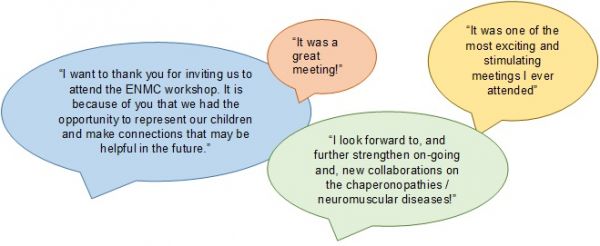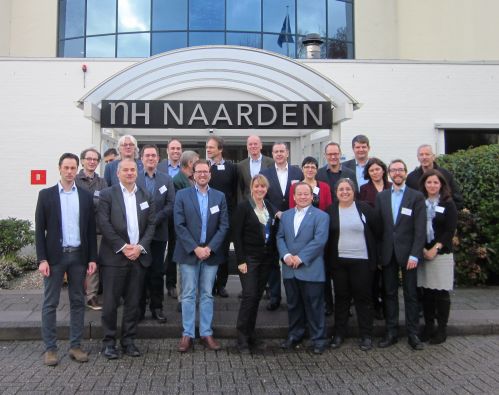Chaperone Dysfunction in muscle disease
- Number 234
- Date 8 December 2017
Location: Naarden, The Netherlands
The 234th ENMC Workshop on Chaperone Dysfunction in Muscle disease
Translations:
Italian by S. Carra
Hebrew by Anat Ben-Zvi
German by A. Roos
Finnish by J. Sarparantaa
Dutch by H. Kampinga and V. Timmerman
December 8-10th 2017, in Naarden, The Netherlands
Organizers: Prof. Conrad Weihl (USA), Prof. Bjarne Udd (Finland), Prof. Michael Hanna (UK)
The workshop was held in Naarden, The Netherlands on 8 – 10th of December in 2017. It was attended by 20 active participants from Australia, Belgium, Denmark, Finland, France, Germany, Italy, Israel, The Netherlands, Sweden, UK and the USA. This group included clinicians, clinical trialists, basic scientists, industry and patient representatives.
With a special thanks to the co-sponsors of this workshop:


Chaperones are essential for the development and maintenance of skeletal muscle. Specifically this large group of proteins ensures that other proteins keep their correct structure and function or facilitates their degradation if this is not possible. Thus, chaperone dysfunction is responsible for many rare hereditary myopathies. Correcting chaperone function may be a therapeutic ption.
The participants reported on various aspects of the involvement of chaperones in a large variety of muscle diseases and disease processes, ranging from primary defects in chaperone genes such as DNAJB6, BAG3 and HSPB8, to the involvement of chaperones in the larger group of degenerative myopathies including sporadic inclusion body myositis (sIBM), and beyond. Because the activity of the chaperones can be increased by different drugs, the main scope of the workshop was to identify opportunities to use the available current knowledge for direct therapies. One therapy, known to increase the activity of protein chaperones, arimoclolol, is already entering the second phase of clinical trials in patients with sIBM. Chaperonopathy patients had their own representatives at the workshop who made highly appreciated contributions focusing on the difficulties in diagnosis and therapies for ultra-rare disorders. Other discussions related to utilizing large datasets and patient cohorts to study these diseases.
Quotations from the participants:

Outcomes and how they will benefit patients:
Improved understanding of the common and shared complexities of disease processes in different chaperone diseases.
Shared lessons regarding using arimoclomol in a clinical trial.
Exchange of data and knowledge amongst participants
Appreciation of the complexity of the chaperone network in skeletal muscle
These outcomes will improve the identification of chaperone associated myopathies and facilitate the treatments of these diseases that share overlapping pathologies.
Future plans and deliverables:
- Extended report of the meeting to be submitted for publication in the Neuromuscular Disorders.
- Establishment of natural history and biomarkers in chaperonopathies.
- Sharing of putative chaperone gene variants with other clinical and basic researchers.
- Agreement on muscle features of “chaperone” dysfunction
- Maintain collaborations amongst this group.

Participants of the 234th ENMC workshop on Chaperone Dysfunction in Muscle Disease
For the last time in NH Hotel in Naarden!
A full report is published in Neuromuscular Disorders (pdf).
